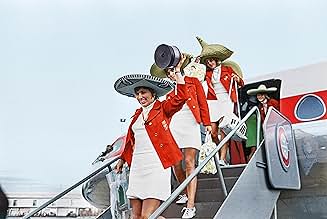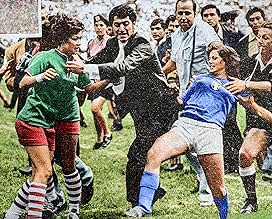Ajouter une intrigue dans votre langueTold by the pioneering women who participated, this is the extraordinary story of the 1971 Women's Soccer World Cup, a tournament witnessed by record crowds that has been written out of spor... Tout lireTold by the pioneering women who participated, this is the extraordinary story of the 1971 Women's Soccer World Cup, a tournament witnessed by record crowds that has been written out of sporting history - until now.Told by the pioneering women who participated, this is the extraordinary story of the 1971 Women's Soccer World Cup, a tournament witnessed by record crowds that has been written out of sporting history - until now.
- Récompenses
- 1 victoire et 7 nominations au total
Jaime De Haro
- Self
- (voix)
Stanley Rous
- Self
- (images d'archives)
Histoire
Le saviez-vous
- AnecdotesCarol Wilson, who played was the England captain in the tournament, was only 19 years old at the time. Three of her teammates, Leah Caleb (age 13), Gill Sayell (14) and Chris Lockwood (15) were still schoolgirls when they played in the tournament.
Commentaire à la une
The 1971 Women's World Cup in Mexico pulled on crowds of 100,000 passionate football fans. Who knew? Well I didn't and that's the point of this documentary, no one does. With an intro from Serena Williams and with many contributors playing in the tournament itself, it's a fascinating account and let's make this clear from the start, it's brilliant. Not just the way it's been put together, which is flawless, but much of the archive footage of the matches is stunning and the football is fabulous. It's a story of repression. Girls and women told that football is not for them and them replying yes it bloody is!! Well, sort of. It's not a tale of out and out rebellion, more a slow burn that started over 100 years ago with girls playing in secret and I guess takes us to present day with players in the WSL becoming household names. The focus here though is Copa 71, the first women's World Cup (still not acknowledged by FIFA) and the players who took that first step. Whether in England, Italy, France, Denmark, Argentina and of course Mexico, the message is the same, let us play. Theres plenty of history, but it goes back much further than the 70s. For instance did you know that in 1917, there were around 100 women's teams in England? How much further we could be if it weren't for doctors... and those are men of course, because women weren't welcome in that world either, saying that football was too dangerous for women and their ovaries. So the FA ban women's football in 1921. Proving that the FA have always been a bunch of idiots. This spreads around the world, but come the 60s enough is enough. It's never gone away, simply forced into the shadows, but here, to a Nancy Sinatra score, woman's football breaks through once more. But why haven't we heard of Copa 71? Well The FA aren't the only idiots of this story and it'll be no surprise to find that FIFA too have their heads stuck up their arses. Nothing's changed there. Not all men are idiots in this story, there are some money grabbing ones too. Off the back of the success of the men's World Cup, Mexico 70. The organisers have a taste for money and think, why not do this again... with women. However, because there's no infrastructure, the football governing bodies around the world refuse to recognise Copa 71 as a World Cup and ignore it. This entire film is bomb blowing apart all that patriarchal oppression, but what's brilliant about it, is the way it puts the players front and centre. They are revolutionaries, they lit the fuse. It's beautiful listening to them talk, reminisce, get choked up as they recall walking into massive stadiums that dwarf many modern structures and are cheered like the heroes they are, but there's ups and downs, winners and losers... it's football. You know what I'm going to say though don't you... there are no real losers here. There is controversy though, again it's football, but the tournament is a hit, both in a sporting nature and commercial clout. It's not just a story about football though. These women were thrust into a volatile situation where the stakes were insanely high, this deftly twists way around each thread of its fascinating narrative. And this is all before we get to the final with a record breaking 110,000 people packed into Mexico City's Azteca Stadium. This had me on the edge of my seat, smiling, utterly gripped. Sadly it's taken far too long for women's football to get the recognition it deserves, but we're finally learning and this film is a valuable lesson. Support women's football and push back against oppressive idiotic male dominated governing bodies who are too stubborn to share the ball. The people on screen here for 90 minutes are an inspiration to us all. A massive thank you to everyone involved in this documentary.
- TakeTwoReviews
- 24 sept. 2024
- Permalien
Meilleurs choix
Connectez-vous pour évaluer et suivre la liste de favoris afin de recevoir des recommandations personnalisées
- How long is Copa 71?Alimenté par Alexa
Détails
- Date de sortie
- Pays d’origine
- Site officiel
- Langues
- Aussi connu sous le nom de
- Copa '71 - succén som tystades ner
- Sociétés de production
- Voir plus de crédits d'entreprise sur IMDbPro
Box-office
- Montant brut mondial
- 197 067 $US
- Durée1 heure 30 minutes
- Couleur
- Rapport de forme
- 2.00 : 1
Contribuer à cette page
Suggérer une modification ou ajouter du contenu manquant













